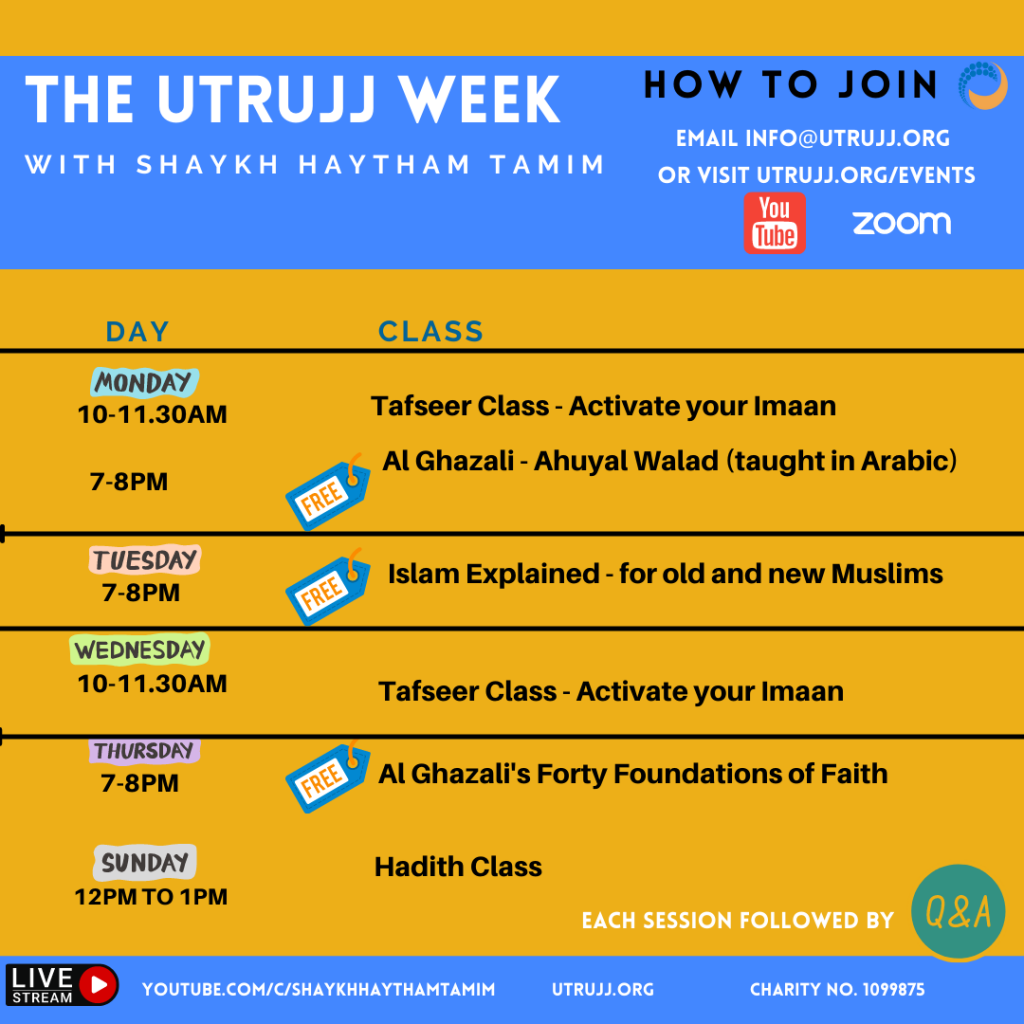Ghazali on the 6 levels of truthfulness

Ghazali lived in 5th century Hijri and his book, Kitaab Al-Arba’in Fi Usul ad-Din, ‘The Forty Principles of the Religion,’ which he wrote before his death, is a summary of Ihya Ulumuddin (Revival of the Sciences of the Religion), and his life’s works and thoughts.
In the last ten principles of the forty, he looks at good traits that we should adopt and nurture within ourselves. The first is tawbah (repentance); the second is khawf (fear) and the third is zuhd (asceticism), the fourth quality is sabr (patience). The fifth quality is shukr (gratitude) and the sixth is ikhlas (sincerity).
Al-Ikhlas and as- sidq (sincerity and truthfulness)
Truthfulness is the pinnacle of sincerity – its perfection.
The link between sidq and sincerity is very close so unusually for Ghazali who usually breaks things down, he has combined them because they overlap.
Truthfulness has 6 ranks. Whoever reaches the level of perfection in all of them deserves the title of siddiq, without achieving it in all of these, you will not be siddiq. We will look at these levels. First let’s look at the verse referring to the siddiqeen.
Fulfilling your covenant with Allah
مِّنَ ٱلْمُؤْمِنِينَ رِجَالٌۭ صَدَقُوا۟ مَا عَـٰهَدُوا۟ ٱللَّهَ عَلَيْهِ ۖ فَمِنْهُم مَّن قَضَىٰ نَحْبَهُۥ وَمِنْهُم مَّن يَنتَظِرُ ۖ وَمَا بَدَّلُوا۟ تَبْدِيلًۭا
Among the believers are men who have proven true to what they pledged to Allah. Some of them have fulfilled their pledge ˹with their lives˺, others are waiting ˹their turn˺. They have never changed ˹their commitment˺ in the least. (33:23)
Who are the truthful Allah was referring to?
Though this verse uses the word ‘men’ (rijaal), it is not restricted to them, but a general term for mankind and specifically believers who are truthful about delivering what they promised to Allah. The explanation of this verse in books of tafseer is very beautiful. The servant of Prophet Muhammad (peace be upon him), Anas ibn Malik (may Allah be pleased with him), said that the background to this verse is about his uncle, Anas ibn Nadr who was unable to participate in the Battle of Badr, though he desperately wanted to. He waited for the next opportunity and when the Battle of Uhud came he approached the Prophet (peace be upon him) and said that he would fight for the sake of Allah and please Him by his bravery. He said:
“O Messenger of Allah (ﷺ)! I was absent from the first battle you fought against the pagans. (By Allah) if Allah gives me a chance to fight the pagans, no doubt. Allah will see how (bravely) I will fight”. (Bukhari)
He fought very courageously against the Quraysh in the Battle of Uhud until he was martyred. As mentioned in Bukhari and Muslim, his body was so badly mutilated with more than eighty wounds from swords and arrows that only his sister could identify his body from his fingers. Then Allah Almighty revealed the verse of the Quran that describes him and those like him who were determined to fulfil their pledge to Him.
During the battle Anas ibn Nadr was so motivated and psyched up to defend Islam that he was like a lion, and when he saw the Prophet (peace be upon him) endangered he was fearless and he shouted to Sa’d bin Muadh that he could smell Jannah, even before he had entered it:
“By the Lord of the Ka`bah! I can smell the fragrance of Jannah from a place closer than Uhud Mount.”
Being truthful with Allah will elevate your rank
The difference between siddiq and sadiq
Ghazali takes us through the ranks of truthfulness. He begins with the first level. Allah Almighty mentioned the truthfulness of Prophet Ibrahim (peace be upon him) in the Quran, whom He calls sidiqan.
وَٱذۡكُرۡ فِی ٱلۡكِتَـٰبِ إِبۡرَ ٰهِیمَۚ إِنَّهُۥ كَانَ صِدِّیقࣰا نَّبِیًّا
Also recount the story of Abraham in the Book. He was a man of truth, and a prophet. (19:41)
The siddiqan is greater than the sadiq, because the word siddiqan is a grammatical form which conveys the continual and profuse repetition of a quality (known in Arabic as seeghatul mubalagha). Siddiq is opposite of khadaab which is the one who is lying all the time. Thus the siddiqan strives for truthfulness until they are written as being perpetually truthful.
Being siddiq is the highest rank which is given to prophets and messengers, as well as righteous people like Abu Bakr, (not just in in our ummah but in the ummahs of previous messengers also) and achieving this level brings one into the best company in Jannah – that of the prophets (anbiya), martyrs (shuhadah) and righteous (saliheen) in Jannah.
Allah, may He be exalted, says (interpretation of the meaning):
وَمَن يُطِعِ ٱللَّهَ وَٱلرَّسُولَ فَأُو۟لَـٰٓئِكَ مَعَ ٱلَّذِينَ أَنْعَمَ ٱللَّهُ عَلَيْهِم مِّنَ ٱلنَّبِيِّـۧنَ وَٱلصِّدِّيقِينَ وَٱلشُّهَدَآءِ وَٱلصَّـٰلِحِينَ ۚ وَحَسُنَ أُو۟لَـٰٓئِكَ رَفِيقًۭا
And whoever obeys Allah and the Messenger will be in the company of those blessed by Allah: the prophets, the people of truth, the martyrs, and the righteous—what honourable company! (4:69)
وَٱلَّذِينَ ءَامَنُوا۟ بِٱللَّهِ وَرُسُلِهِۦٓ أُو۟لَـٰٓئِكَ هُمُ ٱلصِّدِّيقُونَ ۖ وَٱلشُّهَدَآءُ عِندَ رَبِّهِمْ لَهُمْ أَجْرُهُمْ وَنُورُهُمْ
˹As for˺ those who believe in Allah and His messengers, it is they who are ˹truly˺ the people of truth. And the martyrs, with their Lord, will have their reward and their light. (57:19)
It would be great to reach the level of siddiqeen, but how does one achieve it?

Six ranks of truthfulness
Level 1: Always truthful. Do not use the truth to convey false impressions
Sidq has six ranks. The first is sidq qawli which is to be truthful all the time – whether it is about your past, present or future – you should always tell the truth. This does not just mean telling the truth, but also means not implying untruths when making truthful statements. For instance, if someone asks ‘Where is x? and you reply ‘He is not here’ meaning they are not in the room with you, when they are in the room next door, and you have given the false impression that they are not in the house, that is saying one thing but conveying the opposite. This is called ma’areed. Though it is not technically lying, it is conveying a false impression. This can be used effectively when it is necessary, such as when Abu Bakr was asked who his companion was when they were fleeing Makkah and migrating to Madinah pursued by assassins. Abu Bakr was careful in his choice of words – and he spoke the truth when he called the Prophet (peace be upon him) his guide. However this gave the impression that he was his travel guide, when he meant he was his spiritual guide. This was to save his life. Had he revealed his name, he would have been killed. Therefore one can use this in exceptional circumstances, but using this regularly, will cloud your heart
There are people who use ma’reed to dodge the truth all the time. It makes one wary of their company because you are never sure when they are tricking you- even when answering simple questions they are using double meanings. Being in the company of such people makes their habits rub off on you. They may be charismatic and charming, but their friendship will influence you, so you are better off avoiding them.
Ma’reed is an option to save you from a troublesome situation, without lying. It is a last resort.
Being truthful in your statements to Allah
The next level is being truthful in our declarations to Allah. For instance in the Shafi madhab, one says before salah:
وَجَّهْتُ وَجْهِيَ لِلَّذِي فَطَرَ السَّمَوَاتِ وَالأَرْضَ حَنِيفًا وَمَا أَنَا مِنَ الْمُشْرِكِينَ، إِنَّ صَلاَتِي وَنُسُكِي وَمَحْيَاىَ وَمَمَاتِي لِلَّهِ رَبِّ الْعَالَمِينَ، لاَ شَرِيكَ لَهُ، وَبِذَلِكَ أُمِرْتُ، وَأَنَا مِنَ الْمُسْلِمِينَ، اللَّهُمَّ أَنْتَ الْمَلِكُ، لاَ إِلَهَ إِلاَّ أَنْتَ، أَنْتَ رَبِّي، وَأَنَا عَبْدُكَ، ظَلَمْتُ نَفْسِي، وَاعْتَرَفْتُ بِذَنْبِي، فَاغْفِرْ لِي ذُنُوبِي جَمِيعًا، إِنَّهُ لاَ يَغْفِرُ الذُّنُوبَ إِلاَّ أَنْتَ، وَاهْدِنِي لأَحْسَنِ الأَخْلاَقِ، لاَ يَهْدِي لأَحْسَنِهَا إِلاَّ أَنْتَ، وَاصْرِفْ عَنِّي سَيِّئَهَا، لاَ يَصْرِفُ عَنِّي سَيِّئَهَا إِلاَّ أَنْتَ، لَبَّيْكَ وَسَعْدَيْكَ، وَالْخَيْرُ كُلُّهُ فِي يَدَيْكَ، وَالشَّرُّ لَيْسَ إِلَيْكَ، أَنَا بِكَ وَإِلَيْكَ، تَبَارَكْتَ وَتَعَالَيْتَ، أَسْتَغْفِرُكَ وَأَتُوبُ إِلَيْكَ.
I turn my face in complete devotion to One Who is the Originator of the heaven and the earth and I am not of the polytheists. Verily my prayer, my sacrifice, my living and my dying are for Allah, the Lord of the worlds; There is no partner with Him and this is what I have been commanded (to profess and believe) and I am of the believers. O Allah, You are the King, there is no god but You, You are my Lord, and I am Your bondman. I wronged myself and make a confession of my Sin. Forgive all my sins, for no one forgives the sins but You, and guide me in the best of conduct for none but You guides anyone (in) good conduct. Remove sins from me, for no one else but You can remove sins from me. Here I am at Thy service, and Grace is to You and the whole of good is in Your hand, and one cannot get nearness to You through evil. My (power as well as existence) is due to You (Thine grace) and I turn to You (for supplication). You are blessed and You are exalted. I seek forgiveness from You and turn to You in repentance. (Sahih Muslim)
When you make this statement – claiming that you have turned your face to Allah, when in fact you are distracted and you have not turned your heart towards him because it is preoccupied with worldly concerns then it is a lie. This is scary because this the state of all of us. However it is serious, because you are standing before Allah and making a declaration which you do not mean – therefore you are lying.
Another example of this is when you say in the salah, ‘You alone we worship and You alone we ask for help’ (Surat al-Fatihah), and you are not focused on this, but are saying it robotically and absent-mindedly, and worse you are actually worshipping money or others in reality then your statement does not hold up to scrutiny. Abu Hurayrah (may Allah be pleased with him) reported that the Prophet (peace be upon him) described this condition, where one is constantly concerned with trying to make money and acquire and upgrade material possession, and said:
عَنْ أَبِي هُرَيْرَةَ رضى الله عنه قَالَ قَالَ رَسُولُ اللَّهِ صلى الله عليه وسلم تَعِسَ عَبْدُ الدِّينَارِ وَالدِّرْهَمِ وَالْقَطِيفَةِ وَالْخَمِيصَةِ إِنْ أُعْطِيَ رَضِيَ وَإِنْ لَمْ يُعْطَ لَمْ يَرْضَ
“Wretched is the slave of gold, silver, fine clothes, and garments. If he is given, he is pleased, but if he is not given, he is displeased.” (Bukhari)
Level 2: Having purity of intention
The next rank is having a pure intention – the more you mix it the more you dilute the original point. For instance, if you have pure yogurt and you add honey, you change its flavour. Therefore when you have pure intention, do not add anything to it because it waters down or contaminates its purity.
Level 3: Being truthful in your resolve
When you say you will do something when given the chance, then you have to carry this out when you get that opportunity. For instance, if you think that you will give lots of charity when you receive money, then you receive a sum, but you have second thoughts and do not give generously but retain it for yourself, then your resolve is weak. Similarly if you intend that you will do if you get the authority to do it – such as being fair and just – and then you get a position that gives you the power to fulfil this, but you do not, then again this is weakness. By contrast, if you do what you said you would with confidence and without hesitation, that is azm sadiq (strong resolve).
We see this quality in Umar (may Allah be pleased with him) who was very sincere. When Abu Bakr (may Allah be pleased with him) was appointed the calipha after the death of the Prophet (peace be upon him), and some suggested it could be him, he commented that it would be more beloved to him to have his neck chopped off, than to lead with Abu Bakr beneath him. He meant it. We know from his biography that he was a man of the truth. He was not just faking it.
Therefore be careful when making statements that you would do things if you could, and mean what you say. Often people throw out liberal comments about what they would do but if you are sincere about it you will be rewarded for the intention.
Level 4 Fulfilling resolutions with conviction
Sometimes when one’s resolve is weak, one does not carry it out til the end. Seeing something through requires determination. Yet often one makes a half-hearted attempt at fulfilling a promise. If Allah gives you what you asked for, then the fulfilment of your promise is your test. Allah Almighty picked out those who did not fulfil their claims in Surat at-Tawbah:
وَمِنْهُم مَّنْ عَـٰهَدَ ٱللَّهَ لَئِنْ ءَاتَىٰنَا مِن فَضْلِهِۦ لَنَصَّدَّقَنَّ وَلَنَكُونَنَّ مِنَ ٱلصَّـٰلِحِينَ
فَلَمَّآ ءَاتَىٰهُم مِّن فَضْلِهِۦ بَخِلُوا۟ بِهِۦ وَتَوَلَّوا۟ وَّهُم مُّعْرِضُونَ
فَأَعْقَبَهُمْ نِفَاقًۭا فِى قُلُوبِهِمْ إِلَىٰ يَوْمِ يَلْقَوْنَهُۥ بِمَآ أَخْلَفُوا۟ ٱللَّهَ مَا وَعَدُوهُ وَبِمَا كَانُوا۟ يَكْذِبُونَ
And there are some who had made a vow to Allah: “If He gives us from His bounty, we will surely spend in charity and be of the righteous.”
But when He gave them out of His bounty, they withheld it and turned away indifferently.
So He caused hypocrisy to plague their hearts until the Day they will meet Him, for breaking their promise to Allah and for their lies. (9:75-77)
These men were had hypocrisy in their hearts and they were punished. They were stingy when they got the opportunity to give and they broke their promise. Ghazali is showing how things can go wrong when your claims are hot air. In Arabic, there is proverb that those who speak much, do little. In English we say, ‘Actions speak louder than words’.
Level 5 Being consistent inwardly and outwardly
Level 4 was about carrying out one’s verbal commitments but level 5 is about one’s outer appearance matching their inner reality. If someone seems outwardly calm and dignified, it should be a genuine reflection of a calm and dignified person, not an act. Someone who appears tranquil (khashi) in their salah, but is actually only seeking praise and attention is not genuine, but showing off (riya) and demonstrating hypocrisy (nifaq).
The Prophet (peace be upon him) used to make the dua:
اللهم اجعل سريرتي خيرا من علانيتي و اجعل علانيتي صالحة. اللهم إني أسألك من صالح ما تؤتي الناس من المال و الاهل و الولد غير الضال و لا المضل
Allahumaj’al sarirati khayramin ‘alaniyati waj’al ‘alaniyati saliha. Allahuma ini as-aluka min salihi ma tu-tin nasa minal mali wal ahli wal waladi ghayra dalliw wa lal mudill.
‘O Allah, make my inner self better than my outer deeds and make my outer nature good. O Allah, I seek from You the good of what You give to people with regards to family, wealth and children which neither strays nor leads astray.’ (Tirmidhi)
If you are mindful in what you do, then it makes your actions truthful. Hasan al Basri, one of the righteous successors (tabiyeen) would always do what he commanded others to do first, If he told them to do something or to refrain from something, he did so himself to a high level. People said they never saw anyone whose inward and outward matched so closely and his biography is beautiful.
Level 6: the loftiest station
Truthfulness is a station (maqam) like fear (khawf), gratitude (shukr) and contentment (rida) – but out of all stations, it is the loftiest station. The rank of Siddiq is for the one who achieves all five levels. If you only manage some, your rank will be according to what you achieved.
Shaykh Haytham Tamim – Thursday Hadith Class
Related posts
Ghazali on showing off (part 3)
Ghazali on showing off (part 1)
Ghazali on how much wealth is sufficient
Ghazali on breaking free from anger
Evils of the tongue 5 – praise
Evils of the tongue 4 – joking
Evils of the tongue 3 – arguing
Evils of the tongue 2- backbiting
The benefits of feeling hunger
Why is following the sunnah the key to success. Ghazali’s secrets part 1
What is wrong with excessive laughter?
Do you have to practice what you preach?
Self righteousness when giving counsel
Brotherhood, friendship and wilayah
How to deal with difficult neighbours
The first 6 rules of how to deal with people
How to deal with people according to their status (9-11)
Cover the faults of others (12-13)
Defend others in their absence, be tactful, be cautious of the company of the rich (16-18)

Recommended Posts

The truth is more powerful than lies
July 26, 2024

Global IT outage. When systems go down…
July 19, 2024

